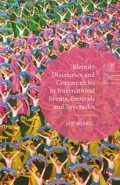Abstract
‘It’s an unbeatable combination of boats, beers, and cheers.’ With this phrase, the Hong Kong Tourism Board (HKTB) marketed its top attraction for June 2013 — the Hong Kong Dragon Boat Carnival, held in Victoria Harbour on 21–23 June.1 This annual event is certainly not the only dragon boat festival held in Hong Kong and in the world. Arguably, the International Dragon Boat Races held in Stanley Harbour in April each year are just as famous. However, there is little doubt that this traditional sporting activity has become an important part not just of Hong Kong life but also of the international tourism agenda for the Hong Kong government. In the past, Hong Kong’s touristic placebranding strategy has been ‘narrowly focussed on the hotel, shopping and dining-out sectors’ (Sofield and Sivan 2003, p. 12); more recently, serious efforts have been made to market other attractions, of which dragon boat racing has become one key element.
Access this chapter
Tax calculation will be finalised at checkout
Purchases are for personal use only
Preview
Unable to display preview. Download preview PDF.
Bibliography
Audit Commission (2014) Director of audit’s report. Available at: http://www.aud.gov.hk/eng/pubpr_arpt/rpt_62.htm [Accessed 22 April 2014].
Bray, D. (2001) Hong Kong metamorphosis. Hong Kong: Hong Kong University Press.
Chan, S. J. (2001) Calendar of traditional Chinese festivals and local celebrations. Hong Kong: Wan Li Book Co.
Chang, L. K. (2008) ‘Post-colonial dragon boat races: Some preliminary thoughts’. Available at: http://www.isdy.net/pdl/eng/2008_09.pdl [Accessed 6 February 2014].
Derlega, V., Harris, M. S. and Chaikin, A. L. (1973) ‘Sell disclose and reciprocity: Liking and the deviant’. Journal of Experimental Social Psychology, 9, pp.227–94.
Gorden, R. L. (1969) Interviewing: Strategy, techniques and tactics. Homewood. IL: Dorsey Press.
Hendry, L. B. (1983) Growing up and going out: Adolescents and leisure. Aberdeen: Aberdeen University Press.
Hobsbawm, E. and Ranger, T. (eds.) (1983) The invention of tradition. Cambridge: Cambridge University Press.
Hong, R (2003) ‘A new exploration into the origin ol Duan Wu festival’. Journal of Guangxi University For Nationalities (Philosophy and Social Science Edition) [in Chinese], 25(3), pp. 150–3.
Hong Kong Government (2010) Asia’s world city. Available at: http://www.inlo.gov.hk/inlo/sar5/easia.htm [Accessed 16 November 2010]
Hong Kong Tourist Board (2013) Annual report 2012/13: The winning formula. Available at: http://www.discoverhongkong.com/eng/about-hktb/annual-report-20122013/strategic_focus/strategic_focus_02html [Accessed 20 March 2014].
Jaeger, K. and Mykletun, R. J. (2013) ‘Festivals, identities, and belonging’. Event Management, 17(3), pp.213–26.
Jin, L. and Jin, K. (2008) ‘The traditional Chinese dragon boat race originating from Yuanling’. Journal ofShiyan Technical Institute [in Chinese], 21(4), pp.56–8.
Kelly, J. R. (1990) Leisure. Englewood Cliffs, NJ: Prentice-Hall.
Lee, T. C. Y. (1979) ‘Message from the Director of Social Welfare’. 1979 International dragon boat races Hong Kong, Sunday, 3 June 1979 Souvenir Programme. HKMS 154–1-189. Hong Kong Public Record Office.
Loh, C. and Lai, C. (2007) Reflections of leadership: Tung Chee Hwa and Donald Tsang, 1997–2007. Hong Kong: Civic Exchange.
Mathews, G., Ma, E. K. W. and Lui, T. L. (2008) Hong Kong, China: Learning to belong to a nation. London: Routledge.
McCartney, G. and Osti, L. (2007) ‘From cultural events to sport events: A case study of cultural authenticity in the dragon boat races’. Journal of Sport and Tourism, 12(1), pp.25–40.
Moeran, B. and Pedersen, J. S. (2011) Negotiating values in the creative industries: Pairs, festivals and competitive events. Cambridge: Cambridge University Press.
Pain, J. H. (1978) ‘Message from Hong Kong Tourist Association’, 1978 International dragon boat races Hong Kong, Sunday 11 June 1978 Souvenir Programme. HKMS 154–2-263. Hong Kong Public Record Office.
Ren, H. (2010) Neoliberalism and culture in China and Hong Kong: The countdown of time. London: Routledge.
Sayre, S. (2001) Qualitative methods for marketplace research. Thousand Oaks, CA: Sage Publications.
Shen, S. (2010) ‘Re-branding without re-developing: Constraints of Hong Kong’s “Asia’s World City” brand (1997–2007)’. The Pacific Review, 23(2), pp.203–24.
Shiratori, Y. (ed.) (1985) The dragon boat festival in Hong Kong. Tokyo: Sophia University.
Silkroad (2013) ‘Unleash the dragon’. June, pp.29–35.
Sofield, T. H. B. and Sivan, A. (2003) ‘From cultural festival to international sport-The Hong Kong dragon boat races’. Journal of Sport Tourism, 8(1), pp.9–20.
Tsang, D. K. Y (2011) ‘Speech in Antwerp, Belgium’. 10 September. Available at: http://www.info.gov.hk/gia/general/201109/10/P201109100234.html [Accessed 20 March 2014].
University of Hong Kong Public Opinion Programme (2013) Available at: http://hkupop.hku.hk/english/popexpress/ethnic/eidentity/poll/datatables. html [Accessed 22 April 2014].
Ward, B. E. and Law, J. (2005) Chinese festivals in Hong Kong. Hong Kong: MCCM Creations.
Wiekhorst, H. (2006) Hong Kong: Mother of dragons. Hong Kong: Creative Dragon Works.
Wong, W. K. (2013) ‘Interpreting political image of Donald Tsang in alternative media’. Lingnan University MCS Symposium Paper, 23 February. Available at: http://www.In.edu.hk/cultural/programme s/MCS/Symp%2013/ S3Pl.pdf [Accessed 15 March 2014].
Worcester, G. R. G. (1971) The junks and sampans of the Yangtze. Annapolis, MD: Naval Institute Press.
Zhang, D. (2002) Thousand years of the dragon boat in Yuanling [in Chinese], Yuanling: Hunan Yuanling Traditional Dragon Boat Committee.
Zhou, G. (1991) ‘The meaning ol dragon boat’, in Li, R. and Yang, P. (eds.) Chinese dragon boat cultural studies [in Chinese]. Guiyang: Guizhou Ethnic Publishing.
Editor information
Editors and Affiliations
Copyright information
© 2015 Brian Bridges and Glos Ho
About this chapter
Cite this chapter
Bridges, B., Ho, G. (2015). Contemporary Images and Identities in the Hong Kong Dragon Boat Festival. In: Merkel, U. (eds) Identity Discourses and Communities in International Events, Festivals and Spectacles. Leisure Studies in a Global Era. Palgrave Macmillan, London. https://doi.org/10.1057/9781137394934_4
Download citation
DOI: https://doi.org/10.1057/9781137394934_4
Publisher Name: Palgrave Macmillan, London
Print ISBN: 978-1-349-48405-8
Online ISBN: 978-1-137-39493-4
eBook Packages: Palgrave Social Sciences CollectionSocial Sciences (R0)

